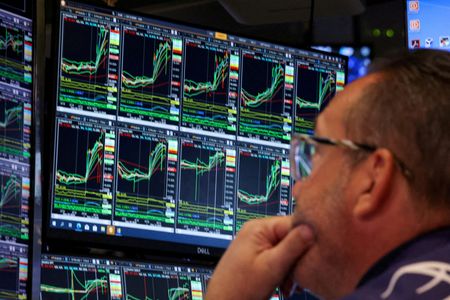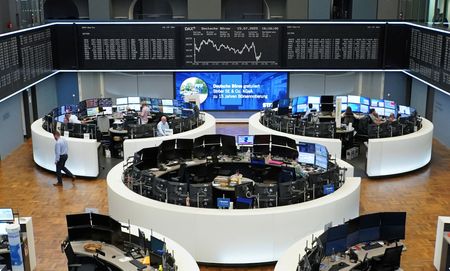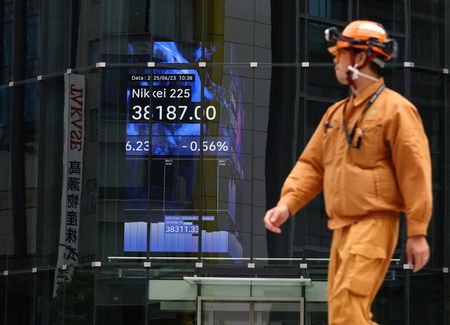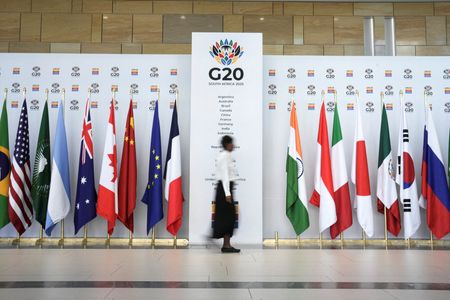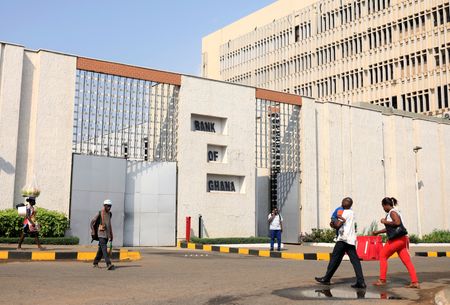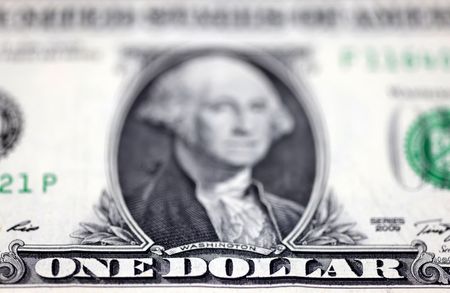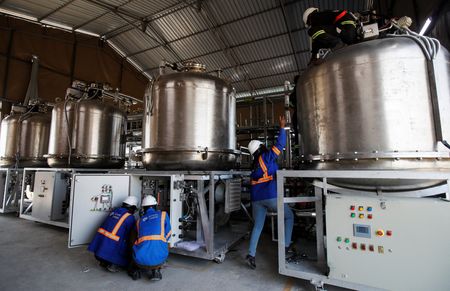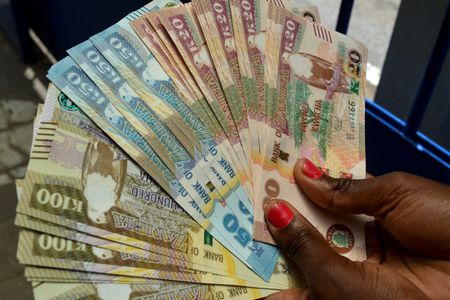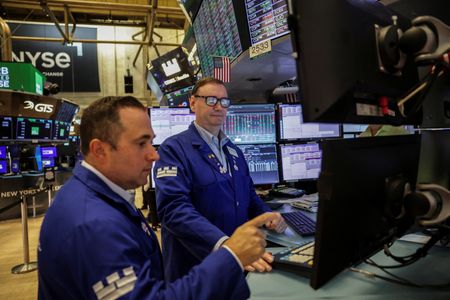By Sinéad Carew and Marc Jones
NEW YORK/LONDON (Reuters) -MSCI’s global equity index advanced on Thursday while the dollar rose as investors were encouraged by the latest crop of economic data and earnings reports while oil futures rose on supply concerns amid Middle East attacks.
Data on jobless claims showed that the number of Americans filing new applications for unemployment benefits fell last week, pointing to steady job growth so far in July, though some laid off workers are experiencing long spells of unemployment because of a moderation in hiring.
U.S. retail sales rebounded more than expected in June, but some of the increase likely reflected higher prices for some goods exposed to tariffs.
“In economic data two key releases came out today: retail sales and jobless claims. Both were better than anticipated,” said Mike Cornacchioli, investment strategy director and senior vice president at Citizens Private Wealth.
“Those two illustrate the strength of the consumer and the labor market. So, a lot of the fears that were placed on the state of the U.S. economy are overblown and have failed to come to fruition at this point in time. Maybe they will some time down the line, but this data and the data that’s come in lately has just reinforced the strength of the US economy.”
Cornacchioli also pointed to strong earnings reports as a boost for equities on Thursday.
Taiwan Semiconductor Manufacturing, the world’s main maker of advanced AI chips, posted record profits ahead of expectations. It warned that future income might be hit by U.S. tariffs, though perhaps not until the fourth quarter. Also, GE Aerospace lifted its profit outlook with jet engine deliveries rising as efforts to fix supply constraints showed results.
After four straight days of losses, Europe’s STOXX 600 index ended up 0.96%, with a boost from strong earnings reports including record orders at Swiss engineering firm ABB.
MSCI’s gauge of stocks across the globe rose 5.29 points, or 0.57%, to 926.40, putting it closer to its recent record levels.
And Wall Street followed Europe higher but at a more modest pace with boosts including PepsiCo PEP.O which rallied more than 7% after reporting better-than-expected quarterly results on steady demand in the U.S. and major markets, including Europe. In another positive sign for the consumer, United Airlines UAL.O shares rose after executives said the company has seen strong bookings in the past three weeks.
At 02:34 p.m., the Dow Jones Industrial Average was up 265.33 points, or 0.60%, at 44,520.11, the S&P 500 rose 35.40 points, or 0.57%, to 6,299.10, which would be a record closing high, and the Nasdaq Composite climbed 163.94 points, or 0.79%, to 20,893.99, hitting fresh record highs.
Thursday’s market gains follow a dramatic wobble during the prior session when Trump said he was highly unlikely to fire Federal Reserve chair Jerome Powell. However, he left the door open to the possibility of ousting him and renewed his criticism of the central bank chief for not cutting U.S. interest rates.
In currencies, the dollar rose on Thursday after the economic data. The dollar index, which measures the greenback against a basket of currencies including the yen and the euro, rose 0.39% to 98.73.
The euro was down 0.42% at $1.1585. Against the Japanese yen, the dollar strengthened 0.58% to 148.72 as polls showed Prime Minister Shigeru Ishiba’s coalition was in danger of losing its majority in the upper house in upcoming elections.
U.S. Treasury yields were higher in a relatively choppy session. Yields had briefly spiked higher and then fallen following the sales and jobless claims data, which showed the world’s largest economy on a stable footing and supported the Fed’s patient stance on monetary easing.
“Consumers did not react to the tariff announcements or the resultant decline in financial markets or the weakness in business and consumer sentiment with defensive recoil. Instead, they went out and bought big ticket items with an opportunistic view,” wrote Tom Simons, chief U.S. economist, at Jefferies in an email after the retail sales data.
The yield on benchmark U.S. 10-year notes rose 0.4 basis points to 4.459%, from 4.455% late on Wednesday while the 30-year bond yield fell 0.4 basis points to 5.0114% from 5.015%.
The 2-year note yield, which typically moves in step with interest rate expectations for the Federal Reserve, rose 3 basis points to 3.915%, from 3.885% late on Wednesday.
Oil prices settled higher after drones struck Iraqi Kurdistan oil fields for a fourth day, pointing to continued risk in the volatile region.
U.S. crude settled up 1.75%, or $1.16 at $67.54 per barrel and Brent settled at $69.52 a barrel, up 1.46%, or $1.00 at $67.54.
“Some of the gains are reaction to drone attacks in Iraq,” said Andrew Lipow, president of Lipow Oil Associates. “It shows how vulnerable oil supplies are to attacks using low technology.”
Gold prices were lower after the upbeat U.S. economic data aided the Fed’s cautious stance on rate cuts.
Spot gold fell 0.26% to $3,337.49 an ounce. U.S. gold futures fell 0.38% to $3,339.90 an ounce.
(Reporting by Sinéad Carew and Gertrude Chavez-Dreyfuss in New York, Marc Jones in London, Rae Wee in Singapore; Editing by Ros Russell, William Maclean and Nick Zieminski)

